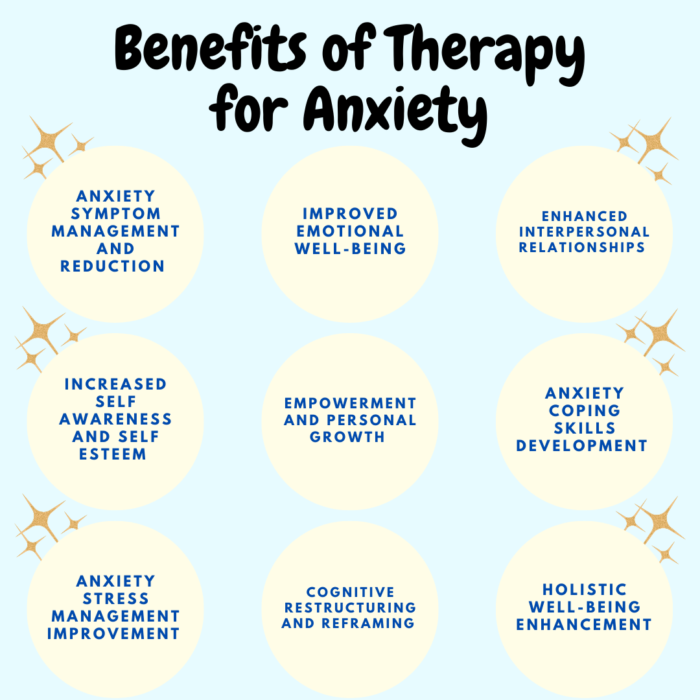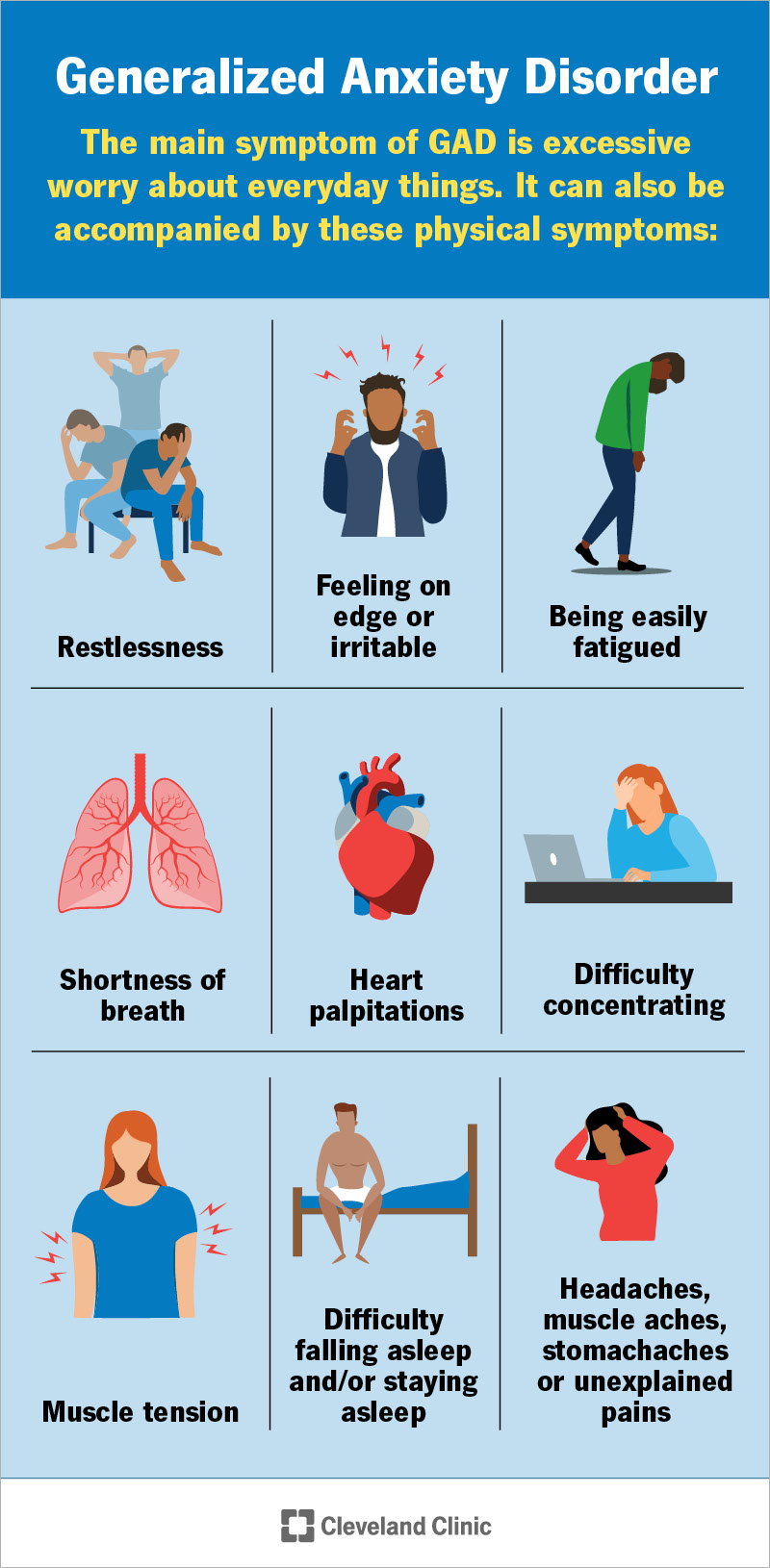Discovering Different Methods in Counselling for Stress And Anxiety Disorder for Lasting Adjustment
When dealing with anxiousness disorders, it's vital to discover a variety of therapy strategies. Each approach offers special understandings and tools to aid you handle your signs and symptoms properly. You might discover that combining techniques can yield the most effective results. Nonetheless, recognizing the nuances of these approaches is crucial to promoting long-term change. What if the appropriate combination could release a brand-new degree of emotional wellness for you?
Understanding Stress And Anxiety Disorders: A Quick Introduction
Stress and anxiety problems, which impact numerous people worldwide, can greatly influence every day life. You may experience overwhelming sensations of concern or fret that seem uncontrollable. These feelings can bring about physical signs and symptoms like an auto racing heart, sweating, or perhaps wooziness. Typical types of anxiousness problems consist of generalised anxiousness disorder, panic attack, and social stress and anxiety condition. Each has special signs, however they all share a tendency to disrupt your routine and relationships.Understanding the origin of your anxiety is essential. It could stem from genetics, mind chemistry, or life experiences. Acknowledging your triggers can assist you manage your reactions better. It is essential to bear in mind that you're not alone in this struggle. Several individuals encounter comparable obstacles, and looking for assistance is a strong step towards feeling much better. By finding out about anxiousness disorders, you're already on the course to understanding and managing your condition better.
Cognitive-Behavioral Treatment: Testing Adverse Idea Patterns
:max_bytes(150000):strip_icc()/GettyImages-814596226-5f685bb021444e6aba7994e617732302.jpg)
Determining Negative Idea Triggers
Acknowledging the details triggers behind your adverse thoughts can be crucial in managing stress and anxiety when you come across moments of distress. Begin by taking note of situations that provoke sensations of concern or fear. Is it a congested area, a future due date, or a discussion with specific individuals? Write down these instances in a journal. This will certainly assist you identify patterns in your thinking. Likewise, notice physical feelings that accompany your unfavorable ideas, like an auto racing heart or tightness in your breast. By identifying these triggers, you obtain understanding into what's fueling your anxiousness. Understanding these links is the primary step in testing those thoughts and eventually gaining back control over your emotional actions.

Replacing Thoughts With Positives
Testing negative thought patterns is an essential action in transforming your frame of mind and minimizing anxiety. You may commonly locate on your own caught in cycles of insecurity or devastating thinking. Instead of letting these ideas determine your feelings, technique changing them with sensible options or positive affirmations. For example, when you believe, "I can not handle this," move it to, "I can take care of challenges one action at once (Counseling services for anxiety)." This easy modification can significantly impact your mood. Consistently determining and responding to these negative thoughts assists produce a healthier internal dialogue. Bear in mind, it takes some time and effort, yet continually exercising this method can cause lasting modification, equipping you to face stress and anxiety with renewed self-confidence and strength
Structure Coping Approaches Together
Changing adverse ideas is just the beginning of handling anxiousness properly. To create enduring adjustment, you need to construct coping approaches that empower you. Cognitive-Behavioral Therapy (CBT) helps you recognize and test those unhelpful thought patterns. With each other, you and your counselor can explore exactly how these thoughts effect your sensations and behaviors.Start by developing useful techniques, like journaling or mindfulness workouts, that enable you to face stress and anxiety head-on. When you face your worries gradually, you'll discover to react in a different way.

Mindfulness and Acceptance-Based Approaches: Cultivating Present-Moment Understanding
As you browse the intricacies of anxiety, integrating mindfulness and acceptance-based methods can substantially boost your ability to grow present-moment recognition. By concentrating on the right here and now, you'll find that you can observe your thoughts and sensations without judgment. This practice helps you recognize your stress and anxiety without feeling bewildered by it.Engaging in mindfulness exercises, such as deep breathing, body scans, or guided reflections, enables you to ground on your own in your present experience. Acceptance-based strategies urge you to welcome your feelings rather than battle against them. When you approve your feelings, they shed their power over you.Incorporating these techniques into your daily regimen can change exactly how you react to anxiousness. You'll create durability and find out to click browse demanding scenarios with greater simplicity. Inevitably, growing present-moment recognition lays the foundation for long lasting modification, equipping you to lead a much more meeting life.
Exposure Therapy: Challenging Anxieties Progressively
Direct exposure therapy helps you confront your fears in a progressive means, making it much less frustrating. You'll learn techniques to face anxiety-provoking situations step by step, while also developing coping techniques to handle your reactions. This strategy encourages you to take control and reduce anxiety over time.
Steady Direct Exposure Techniques
When dealing with stress and see anxiety, gradually confronting your anxieties can be a powerful way to regain control. This strategy, known as gradual exposure, involves slowly exposing on your own to the scenarios or things that activate your stress and anxiety. Begin with less daunting situations and progressively work your means approximately even more challenging ones. As an example, if you're terrified of public talking, you could begin by speaking in front of a mirror, after that advance to sharing ideas with a friend, and eventually deal with a tiny team. Each step aids desensitize you to the worry, constructing your self-confidence with time. Remember, it's necessary to speed yourself and commemorate little triumphes as you move with this procedure, enhancing your capacity to handle stress and anxiety properly.
Building Coping Methods
Building reliable coping strategies is important for handling stress and anxiety, specifically as you challenge your anxieties gradually. One effective approach is direct exposure treatment, where you begin by encountering your concerns in a regulated manner. Start with much less daunting situations and slowly work your method approximately even more challenging circumstances. This gradual exposure helps desensitize you to anxiousness triggers, making them less overwhelming.Incorporate relaxation strategies, such as deep breathing or mindfulness, to calm your mind during exposure. Track your development, celebrating little victories along the road to enhance your confidence. Bear in mind, it's okay to take your time; the goal isn't excellence yet steady improvement. By building these methods, you'll encourage yourself to navigate anxiousness and welcome life extra fully.
Psychodynamic Therapy: Uncovering Root Causes of Anxiety
Psychodynamic therapy discovers the subconscious mind, disclosing the origin of your stress and anxiety - Counseling services for anxiety. By analyzing your thoughts, sensations, and past experiences, this approach helps you uncover underlying problems and unsolved problems that may add to your existing anxiety. You'll deal with a therapist to investigate childhood years experiences, partnerships, and psychological patterns that form your reactions today.As you acquire insight right into these much deeper layers of your subconscious, you'll start to identify just how past occasions influence your existing behavior. This understanding blog can lead to catharsis, permitting you to process feelings you could have suppressed.Through the restorative partnership, you can also identify defense devices that may have developed over time, offering a more clear course to alter. Ultimately, psychodynamic treatment furnishes you with the tools to address your stress and anxiety at its core, advertising enduring improvement in your psychological health
Alternative and integrative Strategies: Combining Strategies for Greater Effectiveness
Integrating different healing techniques can boost your trip towards taking care of anxiousness extra efficiently. By incorporating aspects from cognitive-behavioral treatment, mindfulness techniques, and alternative approaches, you can develop a tailored strategy that resolves your one-of-a-kind demands. As an example, you might use cognitive-behavioral techniques to test adverse thought patterns while incorporating mindfulness workouts to ground yourself in the here and now moment.Additionally, checking out holistic methods such as yoga exercise or reflection can promote leisure and reduce anxiousness signs and symptoms. This mix enables you to create greater self-awareness and resilience.Experimenting with these varied methods can help you discover what reverberates most with you. Keep in mind, it's regarding finding a harmony that functions, instead of sticking to a solitary strategy. This integrative approach not just supplies prompt relief but additionally cultivates long-term abilities for taking care of anxiousness, encouraging you to redeem control over your life.
The Function of Support Equipments: Building Durability With Connection
While it could seem that taking care of anxiety is a solitary journey, having a strong support group can play an important role in your durability. Bordering on your own with empathetic close friends, family members, or support system develops a secure space where you can freely share your feelings and experiences. You advise yourself that you're not alone in this struggle.These partnerships offer support and can offer useful coping techniques that have functioned for others when you link with others. It's also a chance to get point of view; friends can aid you see situations in different ways, decreasing sensations of isolation.Moreover, psychological assistance fosters a feeling of belonging, which can substantially reduce anxiousness signs. By leaning on your support system, you can construct strength and deal with difficulties a lot more effectively. Remember, reaching out for help is an indication of stamina, and it can make all the difference in your journey toward handling anxiety.
Often Asked Questions
What Are the Typical Symptoms of Anxiousness Problems?
You might experience restlessness, exhaustion, trouble concentrating, irritability, muscular tissue stress, and rest disruptions. Physical signs can include quick heartbeat, sweating, and trembling. Acknowledging these indicators early can assist you seek suitable assistance and therapy.

How Lengthy Does Treatment Normally Last for Stress And Anxiety Disorders?
Therapy for stress and anxiety disorders generally lasts anywhere from a few weeks to several months. It really relies on your private needs, progression, and the methods your specialist makes use of to aid you manage your anxiousness successfully.
Can Medicine Be Used Alongside Therapy for Stress and anxiety?
Yes, drug can certainly be utilized alongside treatment for anxiety. Combining both approaches typically boosts treatment efficiency, helping you handle signs and symptoms while discovering underlying problems via counseling. Constantly consult your healthcare service provider for individualized advice.
Exist Self-Help Approaches for Handling Stress And Anxiety?
Yes, there are several self-help techniques for managing anxiousness. You can exercise mindfulness, take part in normal exercise, maintain a balanced diet, develop a routine, and utilize deep breathing strategies to aid minimize anxiety signs successfully.
Exactly how Do I Know if I Need Specialist Assistance for Anxiousness?
You ought to take into consideration seeking expert assistance for anxiousness if it interferes with life, causes considerable distress, or if self-help methods aren't functioning. Depend on your reactions; reaching out can result in much better coping abilities and assistance. Typical kinds of stress and anxiety conditions include generalised anxiousness disorder, panic condition, and social anxiousness condition. When you encounter minutes of distress, recognizing the certain triggers behind your negative ideas can be important in taking care of anxiousness. Changing negative thoughts is just the start of taking care of anxiety properly. By analyzing your thoughts, feelings, and past experiences, this strategy helps you discover underlying conflicts and unsettled concerns that might add to your current stress and anxiety. It's likewise a chance to gain perspective; good friends can assist you see scenarios in different ways, reducing feelings of isolation (Counseling services for anxiety).Moreover, psychological assistance promotes a sense of belonging, which can considerably alleviate anxiety signs and symptoms